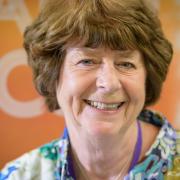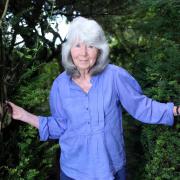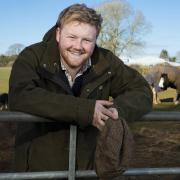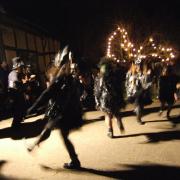Katie Jarvis meets the best-selling author whose intriguing back-story goes a long way towards explaining her literary motivation

Call me shallow (and I’ve been called worse) but I’m pretty much guessing you’ll be on my side here. There are heaps of ways I could start an interview with author Susan Lewis. There’s her utterly gorgeous barn conversion, for one thing, that plays grandmother’s footsteps with the Gloucestershire border. With its myriad shades of white, and light streaming in from huge windows, it’s the kind of dazzling backdrop made-for-TV dramas use to signify a character has now passed to the heavenly realm. (And that’s not pejorative – I absolutely love it.)
“It’s an old hay barn, built on the cross,” Susan says, on the way through to a 25 Beautiful Homes kitchen where she makes coffee. “The hay carts would come in through the front, ditch their load and then go out the back. Not many had the luxury of being able to drive straight through as they could in this one.”
Or I could mention bouncy Coco and shy little Lulu, Cotons de Tuléar (equally white and beautiful), who follow us round with interest and only bark when strictly necessary – such as when they strongly suspect a delivery-driver of being in the vicinity. Both have fallen on all four paws, but particularly Lulu, who was found languishing in a pet shop. “My cleaner rang to tell me she’d seen a little female Coton. I said, ‘Tell them I’m coming to get her! I don’t care what she’s like!’
“We take them everywhere with us. I got thrown out of Cabot Circus because I was walking through the precinct with them on a lead!”
Or – goodness – there are a million other starting points. Like the time Susan lived in LA, with George Clooney as a neighbour. “He had a pot-bellied pig, and I had two dogs – Casanova and Floosy - and I’d take them for a walk in the morning, up through the trail right behind George’s house. This particular morning, Casanova got a whiff of the pig and disappeared off. And there I am, under the bush into George Clooney’s property, shouting, ‘Casanova! Casanova!’ It was only after I’d yelled it a second time that I thought, ‘Oh god!’”
She is funny – lovely, warm and attractive, looking not a scrap her 50-odd years. But the thing is (at the risk of sounding like Loyd Grossman), all the above fits with the life of a bestselling novelist – the dream house; the cute dogs; the Hollywood lifestyle. Even the Cabot Circus bit was a genuine mistake. “I worry now about leaving the dogs in the car for just a few moments while I nip in to change something at House of Fraser”.
You see. Eminently respectable.
So here we go. What I really want to start with – what I have to ask – is this. Is the rumour true that she once went out with one of the FBI’s Most Wanted? I mean, really? Because, while the rest of it fits, that just seems whacky.

She laughs. “Yes, and he was a charmer!” she says, as we sit in front of a blazing fire (designer log-burner) in a cosy corner of this open-plan space. “I met him while I was living in the South of France. I was in my early 30s and starting to earn some money [from books], and it seemed the right thing for a novelist to do – to have this villa in the South of France.”
So let’s just digress and delve a bit further.
Dogs, of course, were high on her list of priorities, and she got her first two, post-French-move, from a friendly, ex-pat family also called Lewis. “It was in getting to know this family that I realised they were working for this particular man, keeping him out of prison. That was their job – driving him around and getting the fake passports.”
So who was this FBI-Wanted charmer? Well, he was running a family business (though not in a warm-glow Cotswold sense of the phrase) with his brother, earning hundreds of millions shipping container-loads of marijuana to Washington State from the Far East.
“I won’t name the celebrities he used to hobnob with because I don’t think they would really care to be reminded they were involved with him.”
Unknowingly, obviously?
“Oh, no. They knew. And then the Lewis family painted such a glamorous picture of him that I was intrigued. I wanted to meet him. It almost felt like I was becoming a heroine in my own novel. So then we did meet, and he was incredibly charming. But I wasn’t thinking straight at all. I mean, did I really think we could have a glamorous life on the run? He was on the Top 10 list, apparently, though I never checked it.”
Well, if you’re going to fall for a criminal, you might as well go for a successful one.

“Yep – not just any old one!”
Anyway. The point of this story is not a moral one - though it could easily be, given that (surprise, surprise), things did not end well. Five months into the relationship, the Charmer gave himself up. “They’d arrested his brother and they sort of blackmailed him: if he didn’t hand himself in, they would sentence his brother to 25 years.
“The two of them thought they could commit this vast crime, make a great fortune, serve what time they had to, and then have everything waiting for them when they came out. But, of course, the FBI had other ideas and took the lot. All the money; all their artwork; even their mother’s apartment. Everything.”
I tell this story for two reasons. The first is rarity value – in my circle of acquaintances, there’s a serious lack of people who’ve gone out with notorious drug barons. But the second is this: in many ways, it’s key to understanding who Susan Lewis is.
Susan Lewis’s novels are full of secrets. Hidden bombshells; family skeletons; unspoken clues as to why relationships are unravelling. She sensitively treads paths where angels blush to tiptoe.
But when she moved to France in her 30s and began that wild, abandoned stretch of sun, sea and celebrity, it was her own life that was unravelling. It wasn’t just her FBI charmer who was on the run.
She was also on the run, from feelings she’d kept under lock and key since childhood. The catastrophe that tipped her over the edge and sent her scurrying to France in the first place was the death of her father. “I was a basket-case,” she admits. “I had this tremendous sense of coming unanchored when my dad died and I think that is not unusual for somebody when their second parent goes.” If moving to France and becoming involved with a criminal might seem mad, then that analysis wouldn’t be far wrong.
To understand why all this came to a head, you need to go back to the Bristol of the 1960s where her parents, Eddress and Eddie, are much like any other couple, full of high hopes for their young children, Susan and Gary. Except that Eddie, a cutter-grinder at an engineering factory in Fishponds, reads Karl Marx and Swinburne and wants to better himself. And Eddress is determined her children will get into the best schools on scholarship and have more of a life than she could dream of.
Oh, and Eddress smokes like a chimney.
When the doctors find a lump in her breast, a gruelling round of operations, radium treatment and hospital visits begin. But the problem isn’t just the cancer; it’s the secrecy that surrounds it. As far as feisty Eddress is concerned, the ‘nosiness’ of the neighbours should at no cost be indulged; the wisdom of the doctors cannot be questioned; and, above all, the children shouldn’t know what’s going on. For seven-year-old Susan, whose mind is constantly questioning and searching, the explanation for her mother’s absences is obvious: she has a second family somewhere she wants to spend time with. Even when the cruel cancer finally wins, Susan refuses to believe anything but her own logic: “Lots of days have gone by now and Mum still hasn’t come back. They had a funeral, but it was only a pretend one because she’s still with her other family somewhere. It’s all right though, she’ll come back when she’s had enough of them.”
We know all about this – about Eddress’s painful illness; about Eddie’s desperate, soul-destroying grief, left on his own with two young children; and about the children themselves, cast adrift without proper support or counselling. We know all about Susan being sent away to a boarding school she hates, where she’s bullied by the ‘posh’ girls – made to stand in an icy bath of water in her pyjamas, taunted as an ‘ugly ginger nut’. We know all about her subsequent expulsion and wild delinquency, which tears out her father’s heart and tosses it around like a plaything; we know about this because Susan details it in two heart-breaking memoirs, Just one more day and One day at a time.
Interestingly, though, it was only after the traumatic FBI episode – when her life was in freefall – that she decided to go back and explore all those feelings that lay buried along with her mother. “It was what tipped me into going into therapy,” she says, still with that soft Bristol burr that characterised her childhood. “I’d had so many disastrous relationships and I thought: I can’t keep going on like this. The one common factor to all the disasters in my life was me. I couldn’t keep blaming everybody else.”
By this time, she was in her 40s, with 15 successful novels under her belt. “But I didn’t start writing the memoirs in order to have them published: it was the therapist I began seeing who suggested it would be helpful for me to write this all down.”
The writing of those memoirs was “very black; very bleak”, though the wise words of her therapist pushed her through: “He said, ‘Just remember: when you are going through the Valley of the Shadow of Death, you keep going; you do not pitch a tent’. And when I was right down at rock-bottom, I would think: I am still moving forward.”
They are astonishingly evocative memoirs. Eddress comes through as adorable: tough, vulnerable, determined. The sort of woman you’d long to know but never want to live next door.
Susan’s dad, Eddie, clearly suffered not just the loss of his wife but the anger of his daughter, caught in a maelstrom of feelings that led her to lash out at the world. Susan spares herself nothing of this torment. “It breaks my heart to think of how I broke my dad’s heart,” she tells me. “I understand on an intellectual level that, of course, I was suffering myself and it was all the result of my mother dying. But I still have a very difficult time trying to forgive myself. I loved him so much. He devoted his life to me and my brother- there’s no doubt about it; and we accepted that in a way that I also regret. He was only 62 when he died.”
The happy ending is this. Susan Lewis is a successful author, living a dream life. After stints in France and LA, she came back to England – not to Bristol, but to Gloucestershire, near enough to her roots to feel as if she’s home. At 50, she met the love of her life, James, now her husband, and relishes being stepmother to his two sons. Despite not having her own children, she writes about families and their problems with a naturalness and empathy that’s won her millions of readers. And she works with Cheltenham-based child-bereavement charity, Winston’s Wish, which offers the sort of support she never had. “They will often work with a family prior to a death; they can address all the questions a parent might have who is preparing to be on their own; or making sure the parent who is going to die has their wishes known.
“Obviously, children lose parents in very different ways and one of the most fantastic programmes they run is helping those whose parents have been murdered or who have committed suicide.”
This year, Susan will be heavily involved with Asda and its Tickled Pink programme, with proceeds to Breast Cancer Care and Breast Cancer Campaign.
…And there’s a cruel irony here: Eddress achieved exactly what she wanted for her daughter. Because there’s no doubt in Susan Lewis’s mind that her mother’s death, and her own subsequent pain, enabled her to write the sort of novels she does. Novels which explore the depths; which understand family difficulties; which provide an emotional rollercoaster and ultimate catharsis for readers.
But the thing about tragedy is this: you have to find the positives.
“And that’s what matters so much to me,” Susan Lewis says. “Getting emails from people who say that whatever they’ve read about – dementia or rape or cancer or drink-driving or brain injury – has either given them a greater understanding of someone they know; or it has helped them not to feel quite so alone in their own grief or betrayal.
“A mother of three even told me she had tried at least a dozen times to give up smoking. And then she read Just one more day. She said, ‘I thought to myself: What on earth am I doing!’
“If it does that for one person, then that book’s worth it. Because those three children are very important; they don’t want to lose their mother.”
Susan Lewis’s latest novel, Too Close to Home, will be published by Century in hardback, price £9.99, on February 26.
--------------------------
This interview by Katie Jarvis is from the February issue of Cotswold Life magazine.
For more from Katie, follow her on Twitter.



























